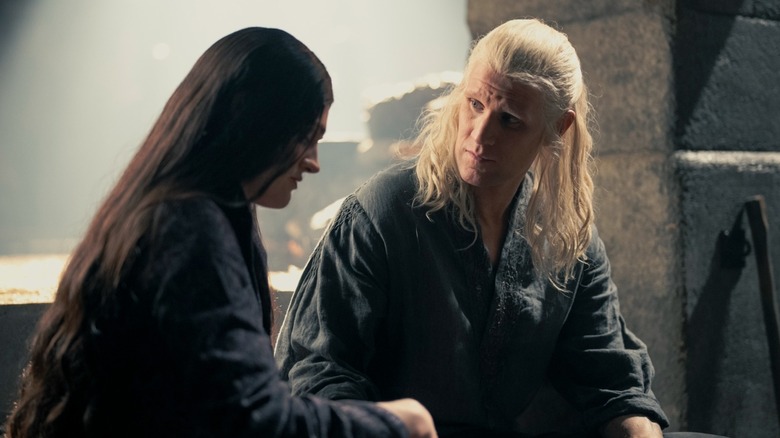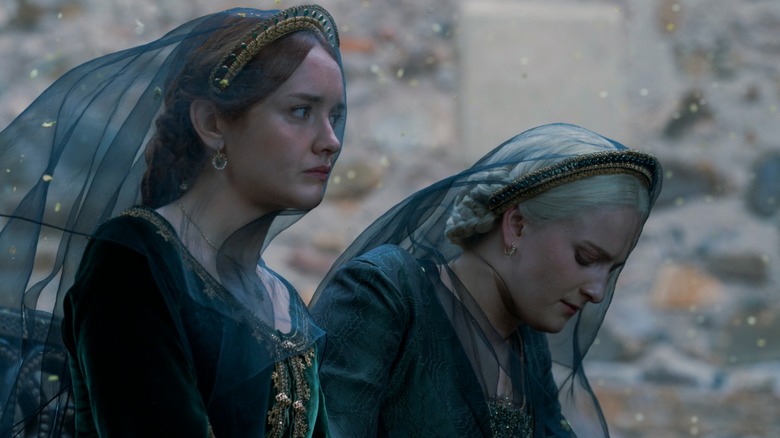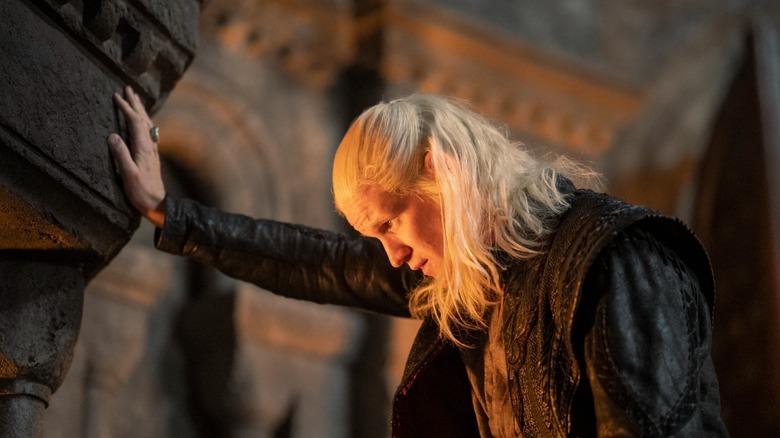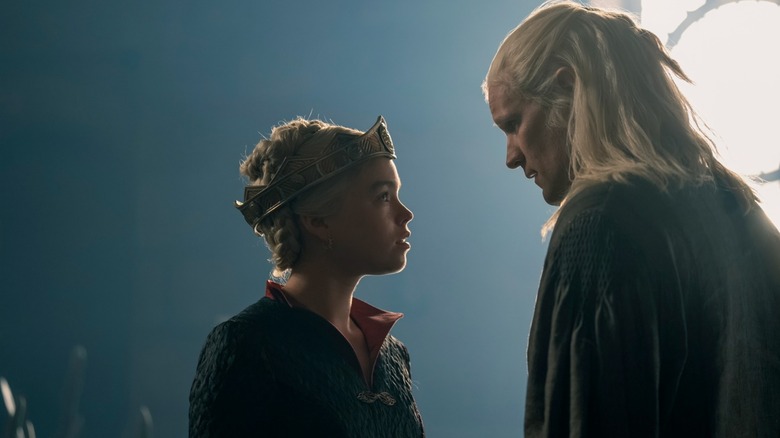The Curse Of Harrenhal Is Exactly What House Of The Dragon Season 2 Needed
This post contains spoilers for "House of the Dragon" season 2, up to episode 5.
On paper, season 2 of "House of the Dragon" has everything "Game of Thrones" fans are always being told we want. There are scenes of scheming and strategy sessions, family tragedies and doomed romances, and bloody dragon battles. There are headline-grabbing major character deaths and fights over power — inherited, won, and stolen alike. Yet I haven't been having a good time watching "House of the Dragon" season 2. Though I was initially a fan of the show's first season, nothing in season 2 — save the one crackling, game-changing scene Olivia Cooke and Emma D'arcy shared — has felt remotely as inspired as the series (or season) that came before it.
Part of the problem here is that the series has short-changed viewers seeking scenes that are as stylish and powerful as the biggest "Game of Thrones" moments, instead favoring an endlessly funereal tone and a season that's studded with scenes — many of them granular political strategy sessions — that fall flatter than they were meant to. Moment by moment, "House of the Dragon" is surprisingly unmemorable. That's what makes this week's episode, particularly scenes in which the enjoyably villainous Prince, er, King Consort Daemon Targaryen (Matt Smith) is beset by the Curse of Harrenhal, a breath of fresh air. The series takes a break from being depressing and redundant to get weird, tripping up both Daemon and the viewers at home with incestuous dream sex, a witchy stranger, and the threat of vengeful old gods.
It's fun to watch Daemon have a bad time, and this show needs fun
For all his faults, Daemon has a tremendous amount of faith in himself. The would-be ruler and partner to Queen Rhaenyra (D'Arcy) wants to run the world and thinks he should, and it's this confidence — to the exclusion of the advice of all others — that gets him into immediate trouble at Harrenhal. The long-cursed location has already made appearances in the prequel series, first as the site of the murders of Lyonel and Harwin Strong, then as a key strategic location for both the Greens and the Blacks in season 2. Most recently, Alys Rivers (Gayle Rankin) told Daemon the castle was haunted, a warning he clearly didn't pay any mind.
I'm glad he didn't: Daemon having a Really Bad Time at Harrenhal makes for better TV than most of "House of the Dragon" season 2. His strong faith in himself (a God complex, in other words) is quickly undermined when he begins to have disturbing dreams and hallucinations, including one in which he cuts off young Rhaenyra's head and another that sees him have sex with his own blood-spattered mother. Daemon is clearly destabilized by these visions, which don't seem to be restricted to when he's unconscious, and frankly, it's great to see bad things happen to bad people for once on this show. Episode after episode has brought us dead kids and grieving moms, but for once, we're shown a character who truly sucks getting some entertainingly strange comeuppance in the form of ghostly psychological torment.
Harrenhal's tricks bring the magic back to Westeros
The Harrenhal plot also brings something else the series had been largely missing: a sense of magic. Whether or not the Harrenhal curse actually amounts to anything is, like a good chunk of the superstition in George R.R. Martin's book series, up to readers and viewers to discern. (You might remember that the ghost of Harrenhal in "Game of Thrones" was actually assassin Jaqen H'ghar.) Nonetheless, the place clearly holds a great power over those who enter its halls. Whether by power of suggestion, mounting guilt and shame, or an actual haunting, Daemon has found himself in the thick of an unnerving situation that seems as if it could have the power to break him. Adding to his woes is the late-night appearance of some locals, who invoke the old and new gods alike to curse him for all the pillaging and plundering his army has been committing in his and Rhaenyra's names.
Obviously, being awoken in the middle of the night is not karmic punishment enough for a man who shrugs off allegations of war crimes, but there's a sense of promise to the locals' assertion that the Riverlands are guarded by deities that don't take kindly to disrespect. Often, this show portrays tragedy and death as something that comes without rhyme or reason, but there's an ironic twist in the idea that Daemon's arrogance and dismissal of those he wishes to rule over could one day be his downfall.
"A Song of Ice and Fire" and its TV counterpart both use foreshadowing, omens, and seemingly prophetic symbolism often, and the sudden presence of it here makes this story feel like a true fantasy epic (as opposed to a political drama with dragons) in the same way that Helaena's prophecies did in season 1. Compared to the flagship show's white walkers and warging, this version of Westeros feels altogether realistic, but the haunts at Harrenhal seem poised to fix that.
Could Daemon's haunting be prophetic?
There's also the appearance of Alys to consider. She's a character whose straight dark hair, long robes, and peculiar way of speaking call to mind the red witch Melisandre, but she's less concerned with supporting a claim to the throne and more preoccupied with the screams of the innocent that she purports to hear on the wind. Daemon is directly responsible for more than a few of those screams, and he seems as haunted by Alys and her direct reference to his mother as he does the ghostly dreams he's been having. Smith, an actor who makes each and every scene he's in more interesting, is especially fun to watch as Daemon begins to become unmoored from reality.
Anyone who's read "Fire & Blood" knows that both the old gods and Harrenhal play a major role in Daemon's eventual fate. While HBO's take on the Dance of Dragons is far from over, the eerie experiences and small displeasures the character now faces seem like slow-building portends of an uneasy future. Plus, they're just fun to watch. If "House of the Dragon" interjects a little more of the uncanny into its endless onslaught of tiny-coffin funerals, season 2 may yet redeem itself.



